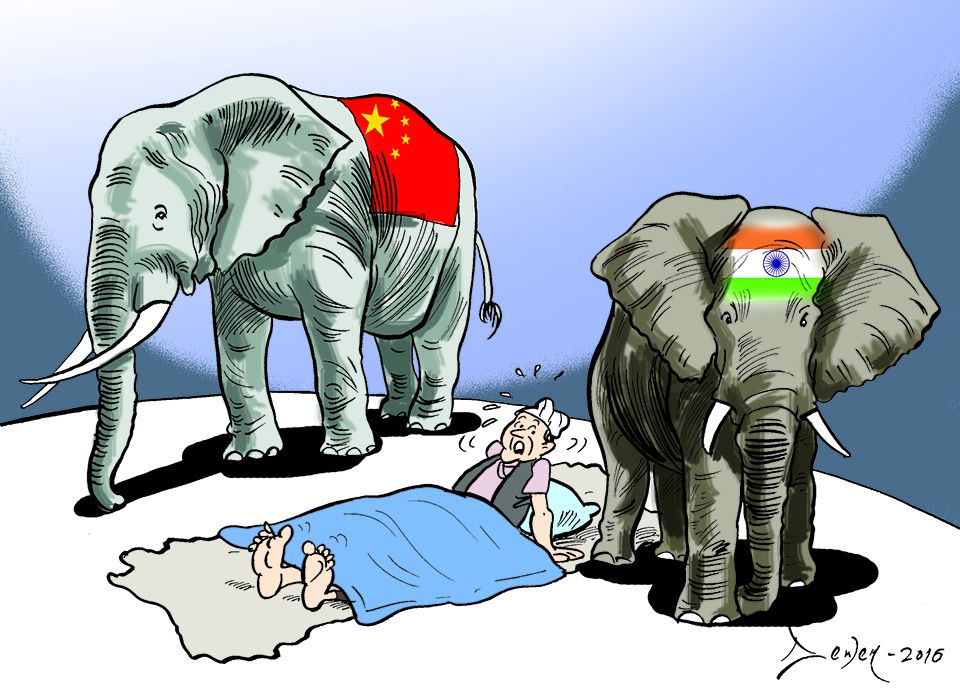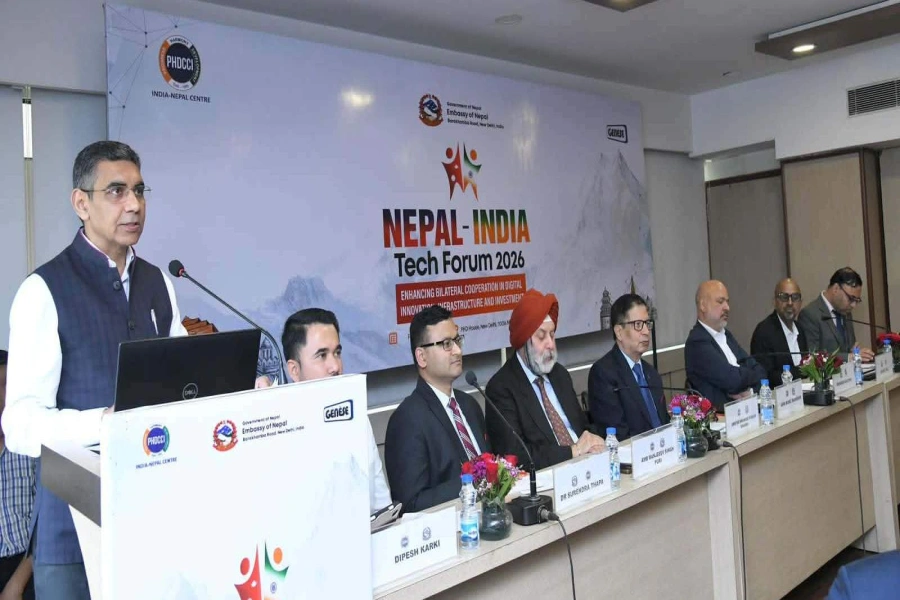Nepal’s landlockedness should be viewed from an agathokakological sense, not just as an ill-fate. Nepal can just give a damn over several ‘economic headaches’ as we are proudly landlocked. The terrorism risk index turns bleak for Nepal, as we are landlocked. Smuggling by sea and dumping is not a big concern for us, only because we are landlocked. So, present this beautiful country as a ‘ land-linked Shangri-la’ rather than a ‘landlocked LDC’.
Despite being a land-linked country situated in between two juxtaposed Asian Giants, Nepal has been economically struggling for decades to remove the structural bottlenecks and awaiting to bear the fruits of development. It is well evident that there is a cornucopia of problems to be solved and we, Nepali citizens and netizens, are all aware of them. Substandard education, aid dependency, brain drain, covert capital flight, and corruption culture tops the chart. But one of these cons quoted by ruling elites as a raison detre of underdevelopment is essentially exaggerated, bragged, and vaguely toppled over our heads.
The majority of political honchos and econo-pundits blame the fate of being landlocked as a misfortune responsible for the status quo of Nepal as if they would have utilized the seashore optimally in the counterfactual scenario. In their aid, Paul Collier, a British Development Economist in his magnum opus ‘The Bottom Billions’, presented landlockedness as one of the four development traps. It’s true that we could have a better economic nexus with the rest of the globe via numerous transits, and enjoy the marine resources. That’s obviously a part, but not the whole, that we miss.
In the evolving global context, there is a multitude of facets that have placed us in a favorable geoposition, which most erudites turn a blindeye on. Thus, debunking this landlockedness dilemma seems to be a sine qua non for sustaining the remaining iota of optimism toward the future.
Cuts the costs of coasts
What kept Nepal poor and how can we become a wealth-creating na...

Firstly, countries with long shorelines suffer a huge need for funds to contain the expanding seas. Building resilient structures to prevent erosion demands expensive engineering options such as seawalls, groynes, breakwaters, etc. In the United States, Coastal erosion is responsible for approximately $500 million per year in coastal property lines including damage to structure and loss of land. To mitigate coastal erosion, the federal government alone spends an average of $150 million each year on beach nourishment.
The situation worsens when it comes to South Asian countries like Bangladesh. According to BWDB (Bangladesh Water Development Board, 2016), approximately 2 billion USD is required to fortify the coastal embankment to withstand natural disasters arising from the sea. Suppose, if we were exposed to the monstrosity of seas, the shrinking revenue pot of our government would have already exploded. But, Nepal can just give a damn over these ‘economic headaches’ as we are proudly landlocked.
Natural barrier against terrorism
Several heinous terror attacks took place in India in recent history when the terrorists exploited the vulnerability of the security loophole of the sea. The Mumbai Attack of 2008 is an epitome of a security threat that emerged straight out of the marine nexus. Controlling seashores for such unimaginable, incalculable and rare events turns too costly for this country of the peninsula. In this realm, we have natural Himalayan barriers toward the north and ‘can-be-controlled’ borders in the rest of the directions. So, the terrorism risk index turns bleak for Nepal, as we are landlocked. Further, we do not need to incur a humongous navy cost, which is truly unproductive.
A natural tariff barrier
Opening Nepal to the world in the early 1990s turned fruitful for a section of comprador bourgeoisies and mushroomed the nouveau riche in a few dominant valleys of this Shangri-la, but as a country with a majority of proletariats, we lost our economic potential and human resources. Our imports hiked up horrendously after the nineties because we opened up too early without strengthening our domestic industries. One can glance over the trend of rice imports and exports over time to corroborate the author's argument. As we were, and still are, merely prepared to compete with the globe, we would have already been a dumping site of cheap imports, if exposed to seas. The current import-export ratio is pitiful but would have been worse. Smuggling by sea and dumping is not a big concern for us, only because we are landlocked.
No maritime disasters
The maritime disasters like cyclones have battered South Asia more, as the Indian Ocean continues rapid warming. So, the frequency and intensity of cyclones have increased and impacted a huge population. A scientific study at NCCR has used satellite imagery to examine 6000 km of India’s coastline and found that between 1990 and 2016, 34-40% of this coast faced severe erosion. Further, alarm bells to some island nations as multiple reports from NASA and US Geological survey stated ‘almost 80% of the Maldives could become uninhabitable by 2050. In a similar fashion, Bangladesh expects tens of millions of climate refugees due to rising sea levels and thus emerged climatic hazards. Oil spills, coral reef protection, and sustaining marine flora and fauna are their economic costs too. And again, Nepal can be carefree.
Pointing out these hidden costs of exposure to the sea, the author does not intend to belittle the numerous benefits that come along with a marine nexus but rather, wants to instill optimism for development potential in the minds of millennials and zoomers, despite being landlocked. These assets of Nepal should believe in a hope of the future amidst the gloomy present. The Nepali urge for development has long suffered ‘reversed Goebbels Syndrome’, i.e, frequent transmission of truth to morally deaf political mass miraculously transforming the truth into a false statement. And excuses like landlockedness are fostering these syndromes.
In a nutshell, landlockedness should be viewed from an agathokakological sense, not just as an ill-fate. Though there is no outright benefit from being surrounded by landmass, this geological position has helped throughout our history to escape from invasions and will continue to cater us economically in the future, if we pragmatically capitalize on it. Lastly, the author urges all Nepalis to present this beautiful country as a ‘ land-linked Shangri-la’ rather than a ‘landlocked LDC’.
(Research Assistant, MBA, (KUSOM))






































